Conference Project Proposal and Initial Plan
VerifiedAdded on 2019/10/18
|36
|7388
|300
Project
AI Summary
This document presents a comprehensive project proposal and initial project plan for organizing a three-day conference. It includes a detailed project overview, objectives, scope, and deliverables. The proposal outlines the project team roles, responsibilities, and risk management strategies. The initial project plan further elaborates on the work breakdown structure, time estimates, resource scheduling, and cost analysis. It also addresses quality targets, control procedures, and communication strategies. The document provides a thorough guide for planning and executing a successful conference, covering all aspects from initiation to closure, including risk mitigation and quality assurance.
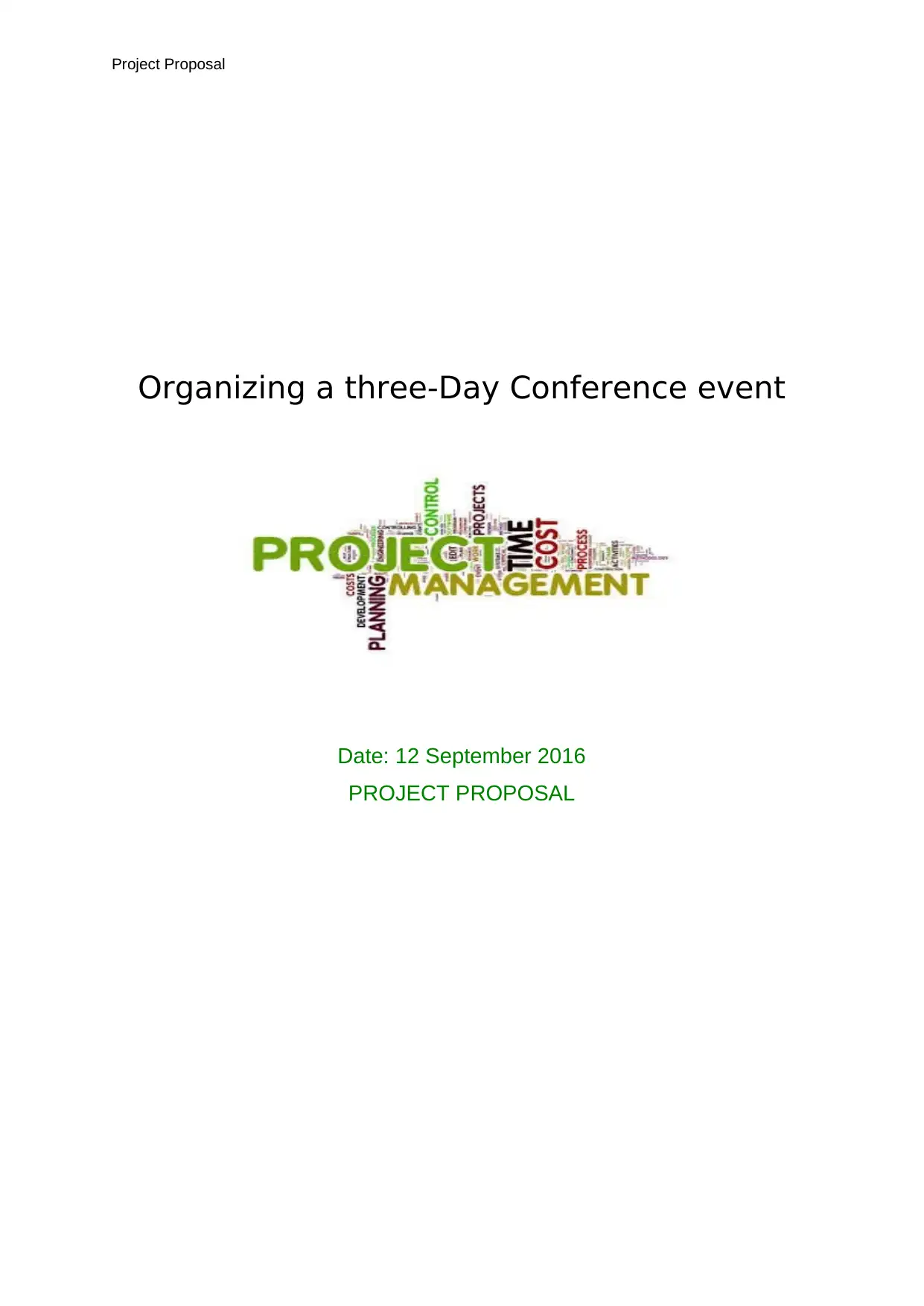
Project Proposal
Organizing a three-Day Conference event
Date: 12 September 2016
PROJECT PROPOSAL
Organizing a three-Day Conference event
Date: 12 September 2016
PROJECT PROPOSAL
Paraphrase This Document
Need a fresh take? Get an instant paraphrase of this document with our AI Paraphraser
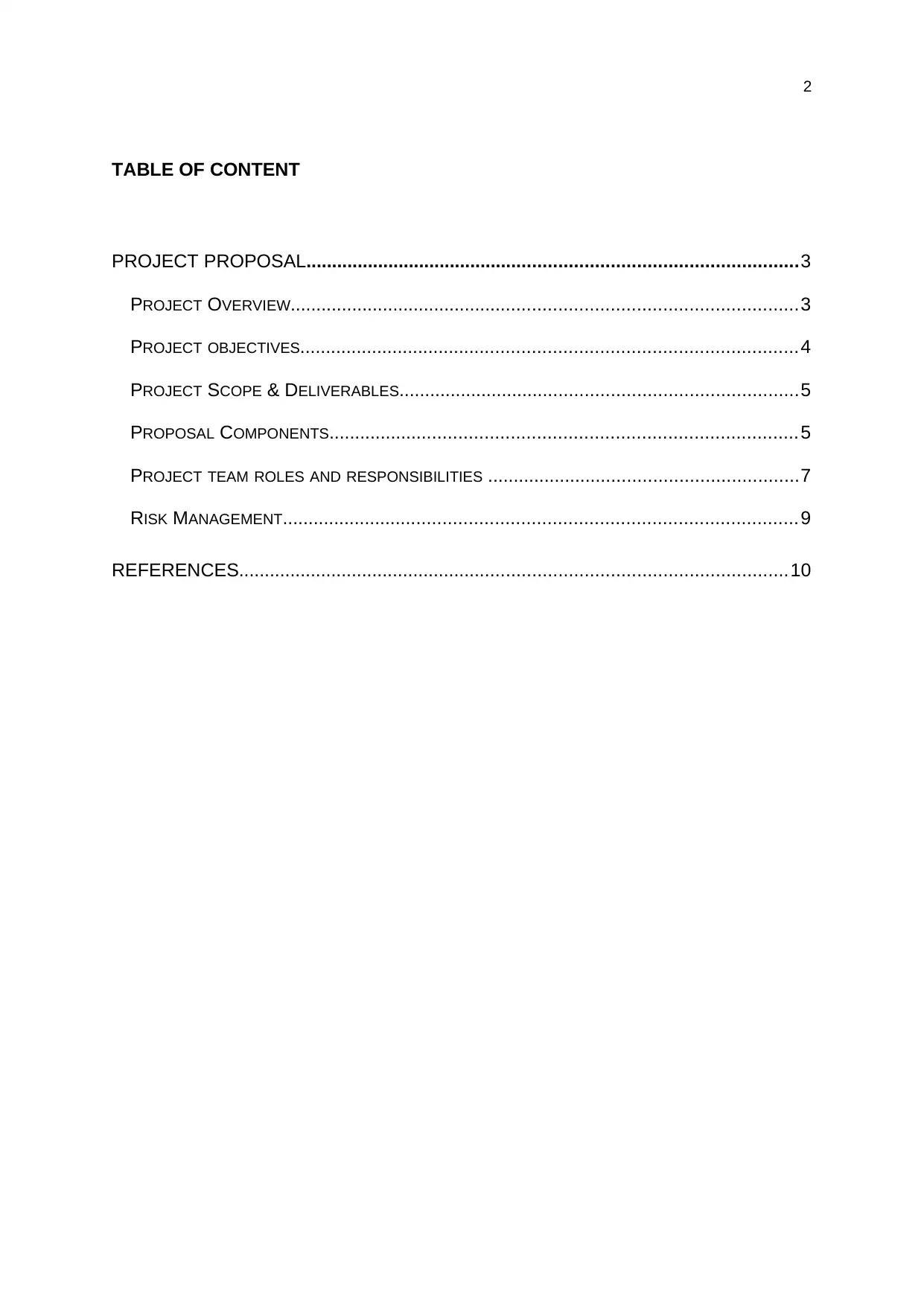
2
TABLE OF CONTENT
PROJECT PROPOSAL...............................................................................................3
PROJECT OVERVIEW..................................................................................................3
PROJECT OBJECTIVES................................................................................................4
PROJECT SCOPE & DELIVERABLES.............................................................................5
PROPOSAL COMPONENTS..........................................................................................5
PROJECT TEAM ROLES AND RESPONSIBILITIES ............................................................7
RISK MANAGEMENT...................................................................................................9
REFERENCES..........................................................................................................10
TABLE OF CONTENT
PROJECT PROPOSAL...............................................................................................3
PROJECT OVERVIEW..................................................................................................3
PROJECT OBJECTIVES................................................................................................4
PROJECT SCOPE & DELIVERABLES.............................................................................5
PROPOSAL COMPONENTS..........................................................................................5
PROJECT TEAM ROLES AND RESPONSIBILITIES ............................................................7
RISK MANAGEMENT...................................................................................................9
REFERENCES..........................................................................................................10
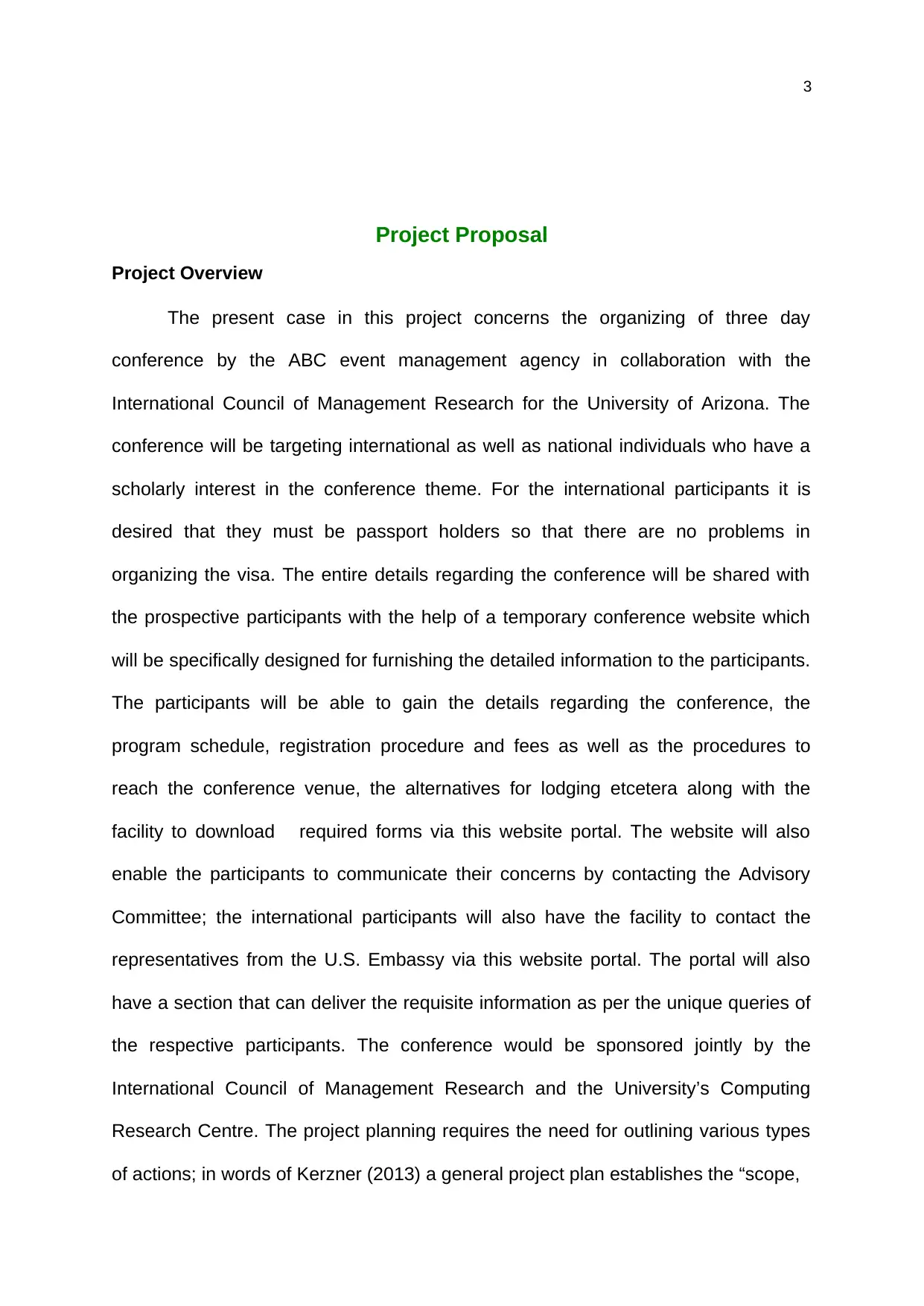
3
Project Proposal
Project Overview
The present case in this project concerns the organizing of three day
conference by the ABC event management agency in collaboration with the
International Council of Management Research for the University of Arizona. The
conference will be targeting international as well as national individuals who have a
scholarly interest in the conference theme. For the international participants it is
desired that they must be passport holders so that there are no problems in
organizing the visa. The entire details regarding the conference will be shared with
the prospective participants with the help of a temporary conference website which
will be specifically designed for furnishing the detailed information to the participants.
The participants will be able to gain the details regarding the conference, the
program schedule, registration procedure and fees as well as the procedures to
reach the conference venue, the alternatives for lodging etcetera along with the
facility to download required forms via this website portal. The website will also
enable the participants to communicate their concerns by contacting the Advisory
Committee; the international participants will also have the facility to contact the
representatives from the U.S. Embassy via this website portal. The portal will also
have a section that can deliver the requisite information as per the unique queries of
the respective participants. The conference would be sponsored jointly by the
International Council of Management Research and the University’s Computing
Research Centre. The project planning requires the need for outlining various types
of actions; in words of Kerzner (2013) a general project plan establishes the “scope,
Project Proposal
Project Overview
The present case in this project concerns the organizing of three day
conference by the ABC event management agency in collaboration with the
International Council of Management Research for the University of Arizona. The
conference will be targeting international as well as national individuals who have a
scholarly interest in the conference theme. For the international participants it is
desired that they must be passport holders so that there are no problems in
organizing the visa. The entire details regarding the conference will be shared with
the prospective participants with the help of a temporary conference website which
will be specifically designed for furnishing the detailed information to the participants.
The participants will be able to gain the details regarding the conference, the
program schedule, registration procedure and fees as well as the procedures to
reach the conference venue, the alternatives for lodging etcetera along with the
facility to download required forms via this website portal. The website will also
enable the participants to communicate their concerns by contacting the Advisory
Committee; the international participants will also have the facility to contact the
representatives from the U.S. Embassy via this website portal. The portal will also
have a section that can deliver the requisite information as per the unique queries of
the respective participants. The conference would be sponsored jointly by the
International Council of Management Research and the University’s Computing
Research Centre. The project planning requires the need for outlining various types
of actions; in words of Kerzner (2013) a general project plan establishes the “scope,
⊘ This is a preview!⊘
Do you want full access?
Subscribe today to unlock all pages.

Trusted by 1+ million students worldwide
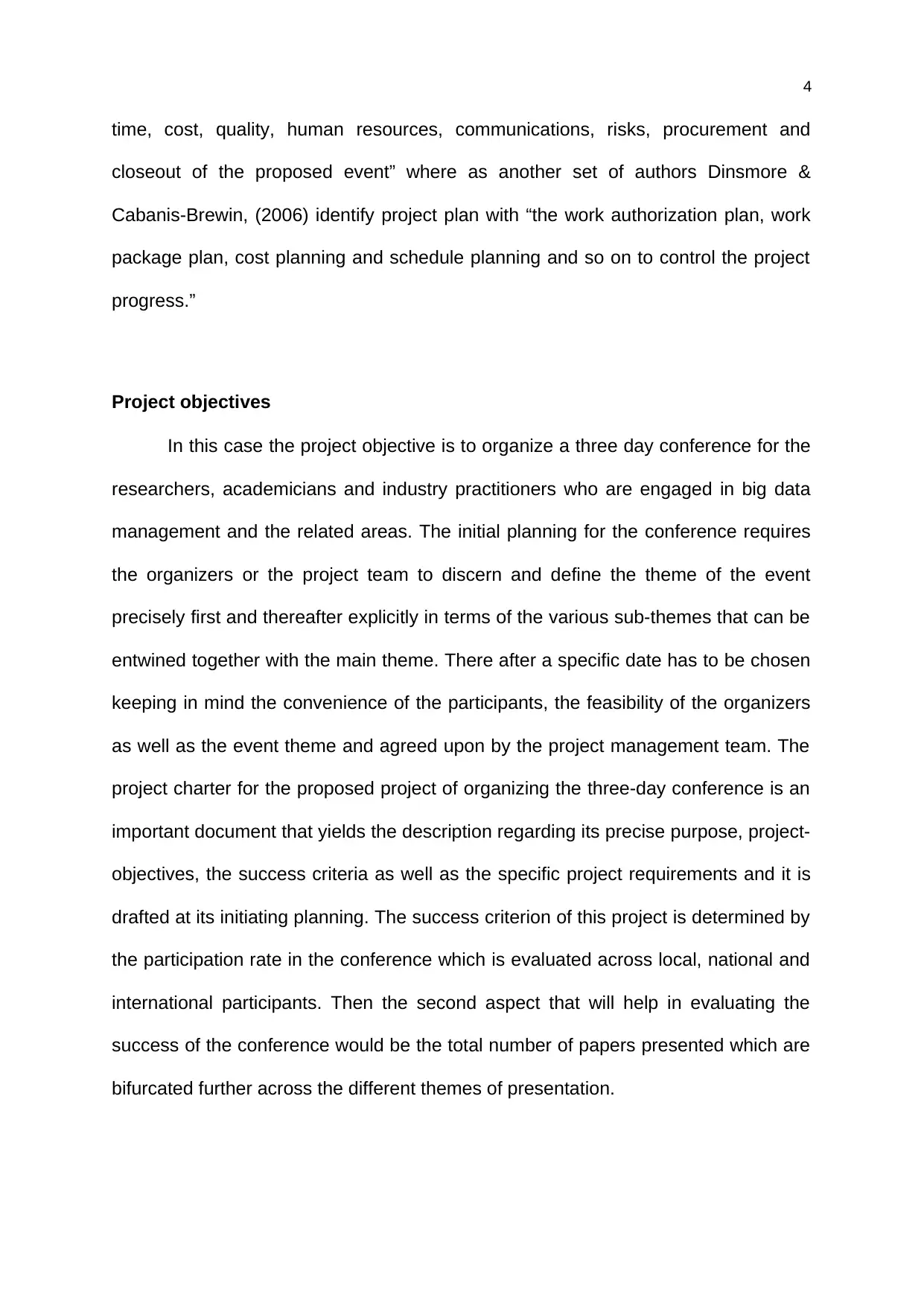
4
time, cost, quality, human resources, communications, risks, procurement and
closeout of the proposed event” where as another set of authors Dinsmore &
Cabanis-Brewin, (2006) identify project plan with “the work authorization plan, work
package plan, cost planning and schedule planning and so on to control the project
progress.”
Project objectives
In this case the project objective is to organize a three day conference for the
researchers, academicians and industry practitioners who are engaged in big data
management and the related areas. The initial planning for the conference requires
the organizers or the project team to discern and define the theme of the event
precisely first and thereafter explicitly in terms of the various sub-themes that can be
entwined together with the main theme. There after a specific date has to be chosen
keeping in mind the convenience of the participants, the feasibility of the organizers
as well as the event theme and agreed upon by the project management team. The
project charter for the proposed project of organizing the three-day conference is an
important document that yields the description regarding its precise purpose, project-
objectives, the success criteria as well as the specific project requirements and it is
drafted at its initiating planning. The success criterion of this project is determined by
the participation rate in the conference which is evaluated across local, national and
international participants. Then the second aspect that will help in evaluating the
success of the conference would be the total number of papers presented which are
bifurcated further across the different themes of presentation.
time, cost, quality, human resources, communications, risks, procurement and
closeout of the proposed event” where as another set of authors Dinsmore &
Cabanis-Brewin, (2006) identify project plan with “the work authorization plan, work
package plan, cost planning and schedule planning and so on to control the project
progress.”
Project objectives
In this case the project objective is to organize a three day conference for the
researchers, academicians and industry practitioners who are engaged in big data
management and the related areas. The initial planning for the conference requires
the organizers or the project team to discern and define the theme of the event
precisely first and thereafter explicitly in terms of the various sub-themes that can be
entwined together with the main theme. There after a specific date has to be chosen
keeping in mind the convenience of the participants, the feasibility of the organizers
as well as the event theme and agreed upon by the project management team. The
project charter for the proposed project of organizing the three-day conference is an
important document that yields the description regarding its precise purpose, project-
objectives, the success criteria as well as the specific project requirements and it is
drafted at its initiating planning. The success criterion of this project is determined by
the participation rate in the conference which is evaluated across local, national and
international participants. Then the second aspect that will help in evaluating the
success of the conference would be the total number of papers presented which are
bifurcated further across the different themes of presentation.
Paraphrase This Document
Need a fresh take? Get an instant paraphrase of this document with our AI Paraphraser
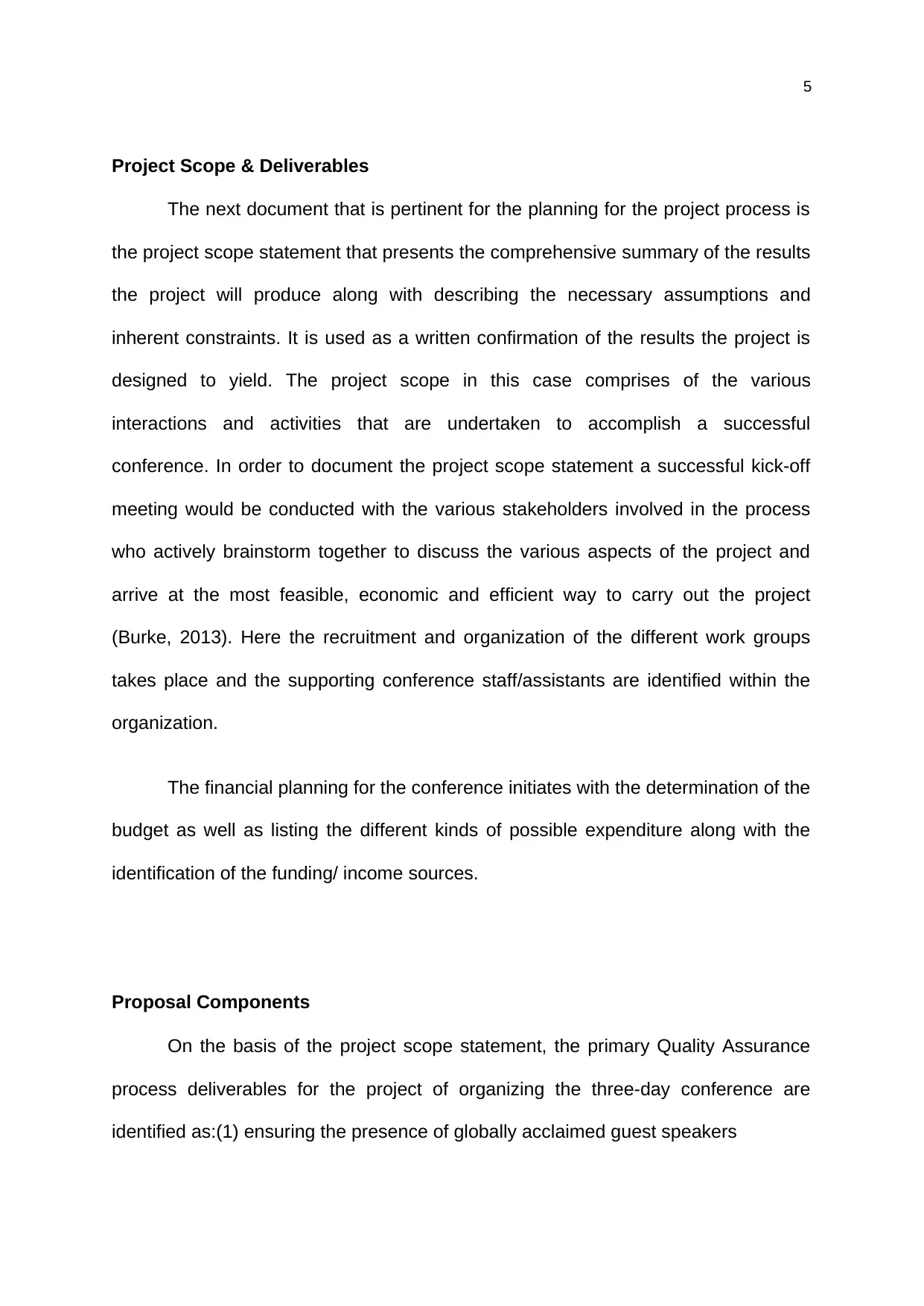
5
Project Scope & Deliverables
The next document that is pertinent for the planning for the project process is
the project scope statement that presents the comprehensive summary of the results
the project will produce along with describing the necessary assumptions and
inherent constraints. It is used as a written confirmation of the results the project is
designed to yield. The project scope in this case comprises of the various
interactions and activities that are undertaken to accomplish a successful
conference. In order to document the project scope statement a successful kick-off
meeting would be conducted with the various stakeholders involved in the process
who actively brainstorm together to discuss the various aspects of the project and
arrive at the most feasible, economic and efficient way to carry out the project
(Burke, 2013). Here the recruitment and organization of the different work groups
takes place and the supporting conference staff/assistants are identified within the
organization.
The financial planning for the conference initiates with the determination of the
budget as well as listing the different kinds of possible expenditure along with the
identification of the funding/ income sources.
Proposal Components
On the basis of the project scope statement, the primary Quality Assurance
process deliverables for the project of organizing the three-day conference are
identified as:(1) ensuring the presence of globally acclaimed guest speakers
Project Scope & Deliverables
The next document that is pertinent for the planning for the project process is
the project scope statement that presents the comprehensive summary of the results
the project will produce along with describing the necessary assumptions and
inherent constraints. It is used as a written confirmation of the results the project is
designed to yield. The project scope in this case comprises of the various
interactions and activities that are undertaken to accomplish a successful
conference. In order to document the project scope statement a successful kick-off
meeting would be conducted with the various stakeholders involved in the process
who actively brainstorm together to discuss the various aspects of the project and
arrive at the most feasible, economic and efficient way to carry out the project
(Burke, 2013). Here the recruitment and organization of the different work groups
takes place and the supporting conference staff/assistants are identified within the
organization.
The financial planning for the conference initiates with the determination of the
budget as well as listing the different kinds of possible expenditure along with the
identification of the funding/ income sources.
Proposal Components
On the basis of the project scope statement, the primary Quality Assurance
process deliverables for the project of organizing the three-day conference are
identified as:(1) ensuring the presence of globally acclaimed guest speakers
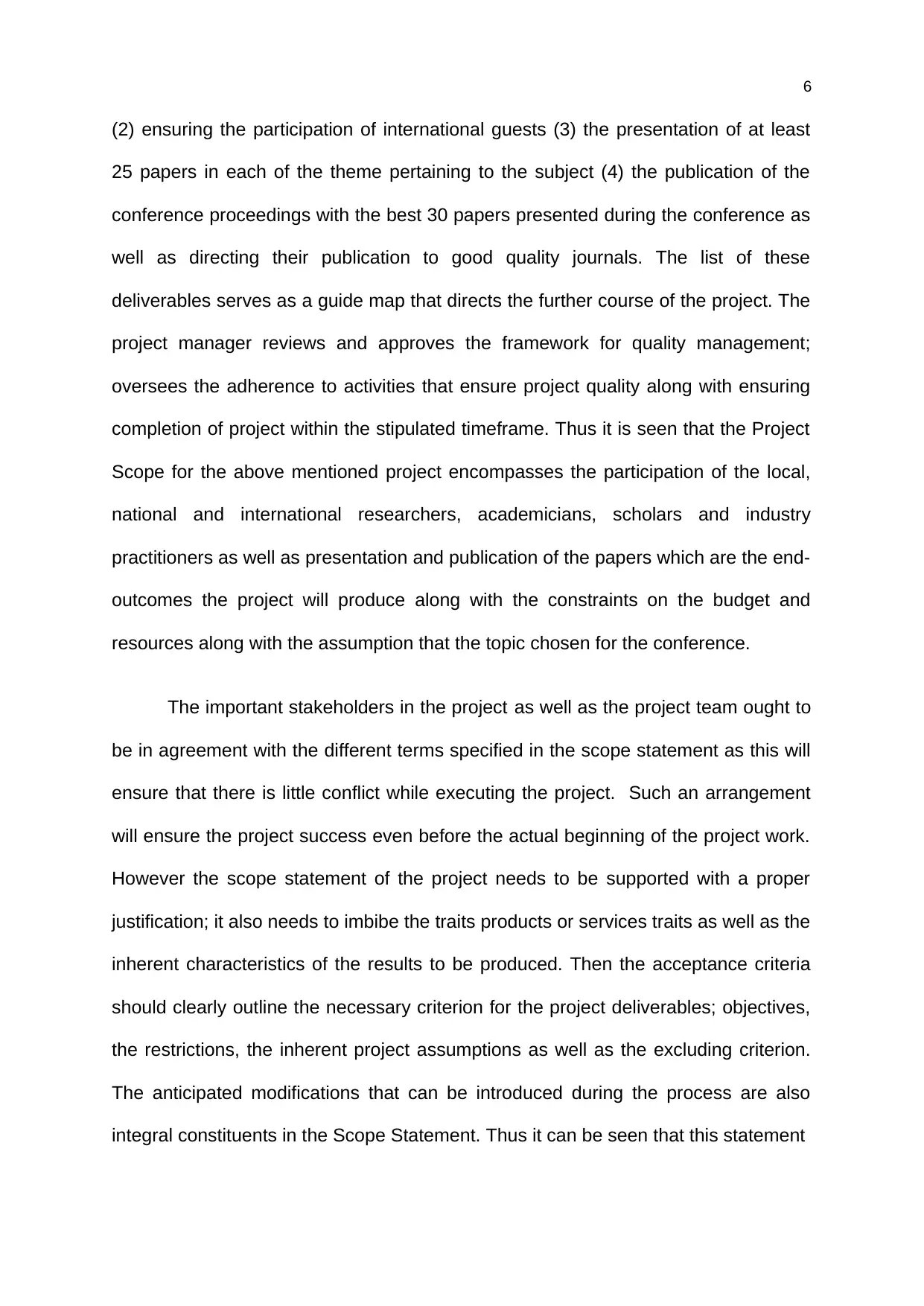
6
(2) ensuring the participation of international guests (3) the presentation of at least
25 papers in each of the theme pertaining to the subject (4) the publication of the
conference proceedings with the best 30 papers presented during the conference as
well as directing their publication to good quality journals. The list of these
deliverables serves as a guide map that directs the further course of the project. The
project manager reviews and approves the framework for quality management;
oversees the adherence to activities that ensure project quality along with ensuring
completion of project within the stipulated timeframe. Thus it is seen that the Project
Scope for the above mentioned project encompasses the participation of the local,
national and international researchers, academicians, scholars and industry
practitioners as well as presentation and publication of the papers which are the end-
outcomes the project will produce along with the constraints on the budget and
resources along with the assumption that the topic chosen for the conference.
The important stakeholders in the project as well as the project team ought to
be in agreement with the different terms specified in the scope statement as this will
ensure that there is little conflict while executing the project. Such an arrangement
will ensure the project success even before the actual beginning of the project work.
However the scope statement of the project needs to be supported with a proper
justification; it also needs to imbibe the traits products or services traits as well as the
inherent characteristics of the results to be produced. Then the acceptance criteria
should clearly outline the necessary criterion for the project deliverables; objectives,
the restrictions, the inherent project assumptions as well as the excluding criterion.
The anticipated modifications that can be introduced during the process are also
integral constituents in the Scope Statement. Thus it can be seen that this statement
(2) ensuring the participation of international guests (3) the presentation of at least
25 papers in each of the theme pertaining to the subject (4) the publication of the
conference proceedings with the best 30 papers presented during the conference as
well as directing their publication to good quality journals. The list of these
deliverables serves as a guide map that directs the further course of the project. The
project manager reviews and approves the framework for quality management;
oversees the adherence to activities that ensure project quality along with ensuring
completion of project within the stipulated timeframe. Thus it is seen that the Project
Scope for the above mentioned project encompasses the participation of the local,
national and international researchers, academicians, scholars and industry
practitioners as well as presentation and publication of the papers which are the end-
outcomes the project will produce along with the constraints on the budget and
resources along with the assumption that the topic chosen for the conference.
The important stakeholders in the project as well as the project team ought to
be in agreement with the different terms specified in the scope statement as this will
ensure that there is little conflict while executing the project. Such an arrangement
will ensure the project success even before the actual beginning of the project work.
However the scope statement of the project needs to be supported with a proper
justification; it also needs to imbibe the traits products or services traits as well as the
inherent characteristics of the results to be produced. Then the acceptance criteria
should clearly outline the necessary criterion for the project deliverables; objectives,
the restrictions, the inherent project assumptions as well as the excluding criterion.
The anticipated modifications that can be introduced during the process are also
integral constituents in the Scope Statement. Thus it can be seen that this statement
⊘ This is a preview!⊘
Do you want full access?
Subscribe today to unlock all pages.

Trusted by 1+ million students worldwide
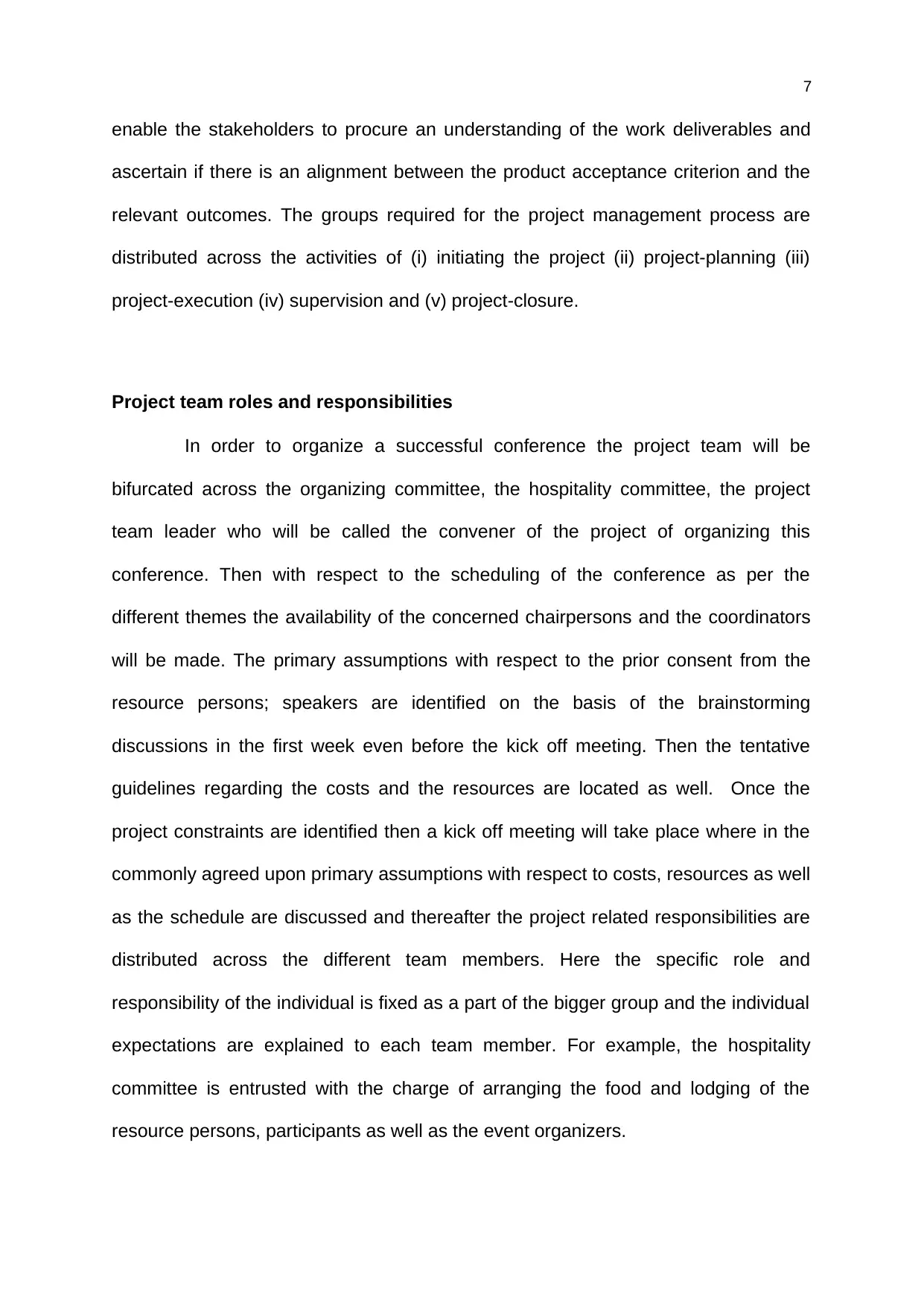
7
enable the stakeholders to procure an understanding of the work deliverables and
ascertain if there is an alignment between the product acceptance criterion and the
relevant outcomes. The groups required for the project management process are
distributed across the activities of (i) initiating the project (ii) project-planning (iii)
project-execution (iv) supervision and (v) project-closure.
Project team roles and responsibilities
In order to organize a successful conference the project team will be
bifurcated across the organizing committee, the hospitality committee, the project
team leader who will be called the convener of the project of organizing this
conference. Then with respect to the scheduling of the conference as per the
different themes the availability of the concerned chairpersons and the coordinators
will be made. The primary assumptions with respect to the prior consent from the
resource persons; speakers are identified on the basis of the brainstorming
discussions in the first week even before the kick off meeting. Then the tentative
guidelines regarding the costs and the resources are located as well. Once the
project constraints are identified then a kick off meeting will take place where in the
commonly agreed upon primary assumptions with respect to costs, resources as well
as the schedule are discussed and thereafter the project related responsibilities are
distributed across the different team members. Here the specific role and
responsibility of the individual is fixed as a part of the bigger group and the individual
expectations are explained to each team member. For example, the hospitality
committee is entrusted with the charge of arranging the food and lodging of the
resource persons, participants as well as the event organizers.
enable the stakeholders to procure an understanding of the work deliverables and
ascertain if there is an alignment between the product acceptance criterion and the
relevant outcomes. The groups required for the project management process are
distributed across the activities of (i) initiating the project (ii) project-planning (iii)
project-execution (iv) supervision and (v) project-closure.
Project team roles and responsibilities
In order to organize a successful conference the project team will be
bifurcated across the organizing committee, the hospitality committee, the project
team leader who will be called the convener of the project of organizing this
conference. Then with respect to the scheduling of the conference as per the
different themes the availability of the concerned chairpersons and the coordinators
will be made. The primary assumptions with respect to the prior consent from the
resource persons; speakers are identified on the basis of the brainstorming
discussions in the first week even before the kick off meeting. Then the tentative
guidelines regarding the costs and the resources are located as well. Once the
project constraints are identified then a kick off meeting will take place where in the
commonly agreed upon primary assumptions with respect to costs, resources as well
as the schedule are discussed and thereafter the project related responsibilities are
distributed across the different team members. Here the specific role and
responsibility of the individual is fixed as a part of the bigger group and the individual
expectations are explained to each team member. For example, the hospitality
committee is entrusted with the charge of arranging the food and lodging of the
resource persons, participants as well as the event organizers.
Paraphrase This Document
Need a fresh take? Get an instant paraphrase of this document with our AI Paraphraser
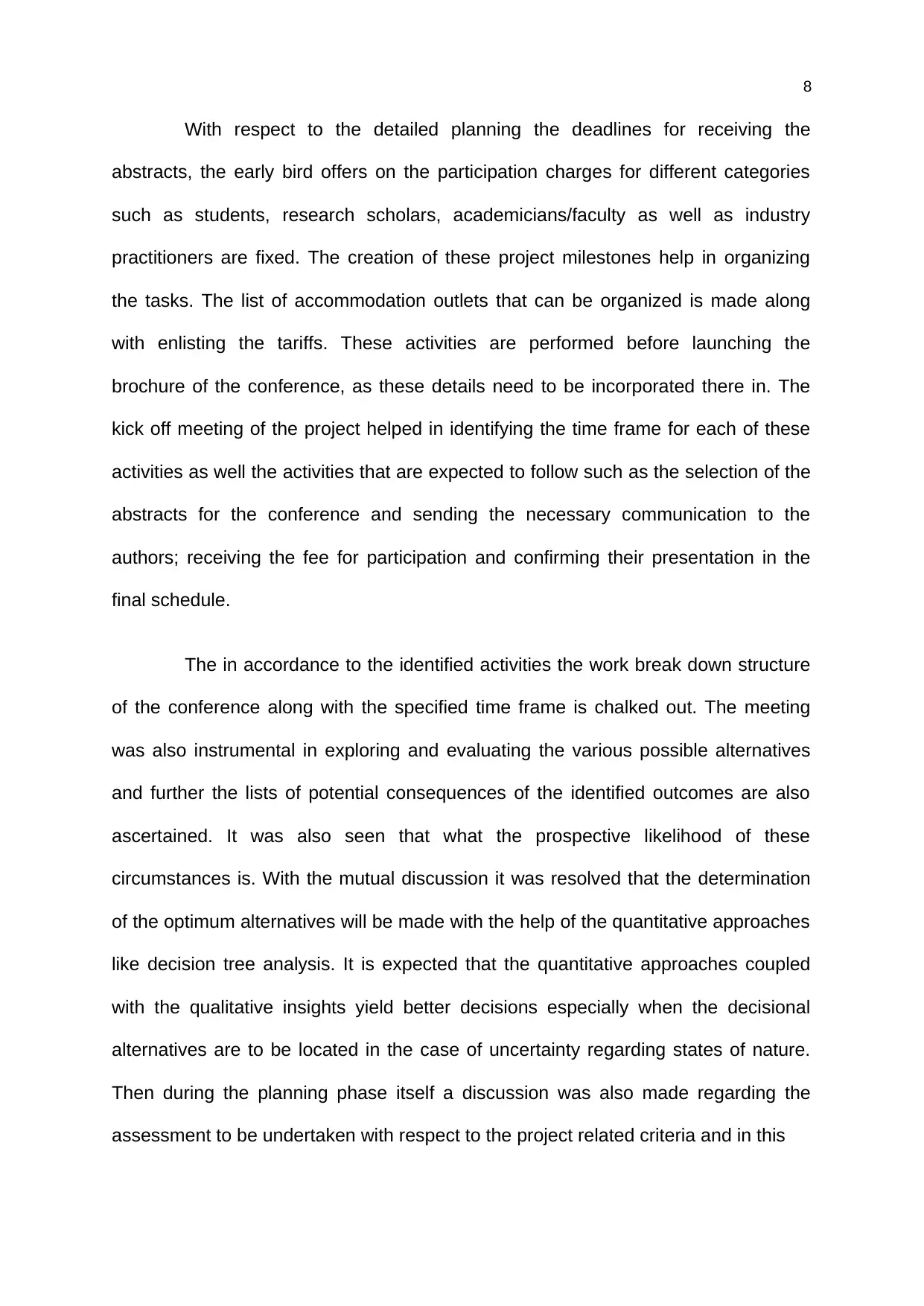
8
With respect to the detailed planning the deadlines for receiving the
abstracts, the early bird offers on the participation charges for different categories
such as students, research scholars, academicians/faculty as well as industry
practitioners are fixed. The creation of these project milestones help in organizing
the tasks. The list of accommodation outlets that can be organized is made along
with enlisting the tariffs. These activities are performed before launching the
brochure of the conference, as these details need to be incorporated there in. The
kick off meeting of the project helped in identifying the time frame for each of these
activities as well the activities that are expected to follow such as the selection of the
abstracts for the conference and sending the necessary communication to the
authors; receiving the fee for participation and confirming their presentation in the
final schedule.
The in accordance to the identified activities the work break down structure
of the conference along with the specified time frame is chalked out. The meeting
was also instrumental in exploring and evaluating the various possible alternatives
and further the lists of potential consequences of the identified outcomes are also
ascertained. It was also seen that what the prospective likelihood of these
circumstances is. With the mutual discussion it was resolved that the determination
of the optimum alternatives will be made with the help of the quantitative approaches
like decision tree analysis. It is expected that the quantitative approaches coupled
with the qualitative insights yield better decisions especially when the decisional
alternatives are to be located in the case of uncertainty regarding states of nature.
Then during the planning phase itself a discussion was also made regarding the
assessment to be undertaken with respect to the project related criteria and in this
With respect to the detailed planning the deadlines for receiving the
abstracts, the early bird offers on the participation charges for different categories
such as students, research scholars, academicians/faculty as well as industry
practitioners are fixed. The creation of these project milestones help in organizing
the tasks. The list of accommodation outlets that can be organized is made along
with enlisting the tariffs. These activities are performed before launching the
brochure of the conference, as these details need to be incorporated there in. The
kick off meeting of the project helped in identifying the time frame for each of these
activities as well the activities that are expected to follow such as the selection of the
abstracts for the conference and sending the necessary communication to the
authors; receiving the fee for participation and confirming their presentation in the
final schedule.
The in accordance to the identified activities the work break down structure
of the conference along with the specified time frame is chalked out. The meeting
was also instrumental in exploring and evaluating the various possible alternatives
and further the lists of potential consequences of the identified outcomes are also
ascertained. It was also seen that what the prospective likelihood of these
circumstances is. With the mutual discussion it was resolved that the determination
of the optimum alternatives will be made with the help of the quantitative approaches
like decision tree analysis. It is expected that the quantitative approaches coupled
with the qualitative insights yield better decisions especially when the decisional
alternatives are to be located in the case of uncertainty regarding states of nature.
Then during the planning phase itself a discussion was also made regarding the
assessment to be undertaken with respect to the project related criteria and in this
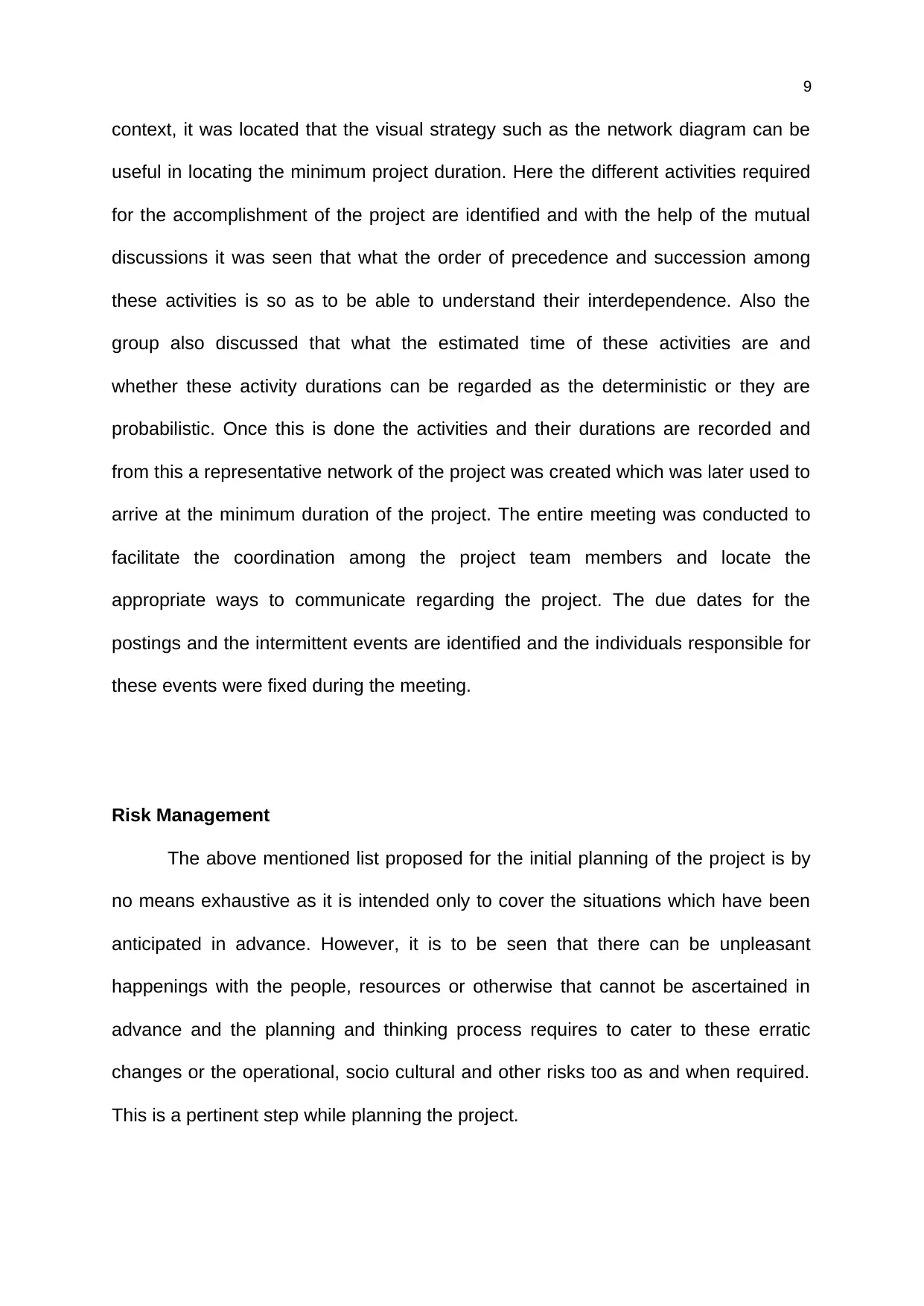
9
context, it was located that the visual strategy such as the network diagram can be
useful in locating the minimum project duration. Here the different activities required
for the accomplishment of the project are identified and with the help of the mutual
discussions it was seen that what the order of precedence and succession among
these activities is so as to be able to understand their interdependence. Also the
group also discussed that what the estimated time of these activities are and
whether these activity durations can be regarded as the deterministic or they are
probabilistic. Once this is done the activities and their durations are recorded and
from this a representative network of the project was created which was later used to
arrive at the minimum duration of the project. The entire meeting was conducted to
facilitate the coordination among the project team members and locate the
appropriate ways to communicate regarding the project. The due dates for the
postings and the intermittent events are identified and the individuals responsible for
these events were fixed during the meeting.
Risk Management
The above mentioned list proposed for the initial planning of the project is by
no means exhaustive as it is intended only to cover the situations which have been
anticipated in advance. However, it is to be seen that there can be unpleasant
happenings with the people, resources or otherwise that cannot be ascertained in
advance and the planning and thinking process requires to cater to these erratic
changes or the operational, socio cultural and other risks too as and when required.
This is a pertinent step while planning the project.
context, it was located that the visual strategy such as the network diagram can be
useful in locating the minimum project duration. Here the different activities required
for the accomplishment of the project are identified and with the help of the mutual
discussions it was seen that what the order of precedence and succession among
these activities is so as to be able to understand their interdependence. Also the
group also discussed that what the estimated time of these activities are and
whether these activity durations can be regarded as the deterministic or they are
probabilistic. Once this is done the activities and their durations are recorded and
from this a representative network of the project was created which was later used to
arrive at the minimum duration of the project. The entire meeting was conducted to
facilitate the coordination among the project team members and locate the
appropriate ways to communicate regarding the project. The due dates for the
postings and the intermittent events are identified and the individuals responsible for
these events were fixed during the meeting.
Risk Management
The above mentioned list proposed for the initial planning of the project is by
no means exhaustive as it is intended only to cover the situations which have been
anticipated in advance. However, it is to be seen that there can be unpleasant
happenings with the people, resources or otherwise that cannot be ascertained in
advance and the planning and thinking process requires to cater to these erratic
changes or the operational, socio cultural and other risks too as and when required.
This is a pertinent step while planning the project.
⊘ This is a preview!⊘
Do you want full access?
Subscribe today to unlock all pages.

Trusted by 1+ million students worldwide
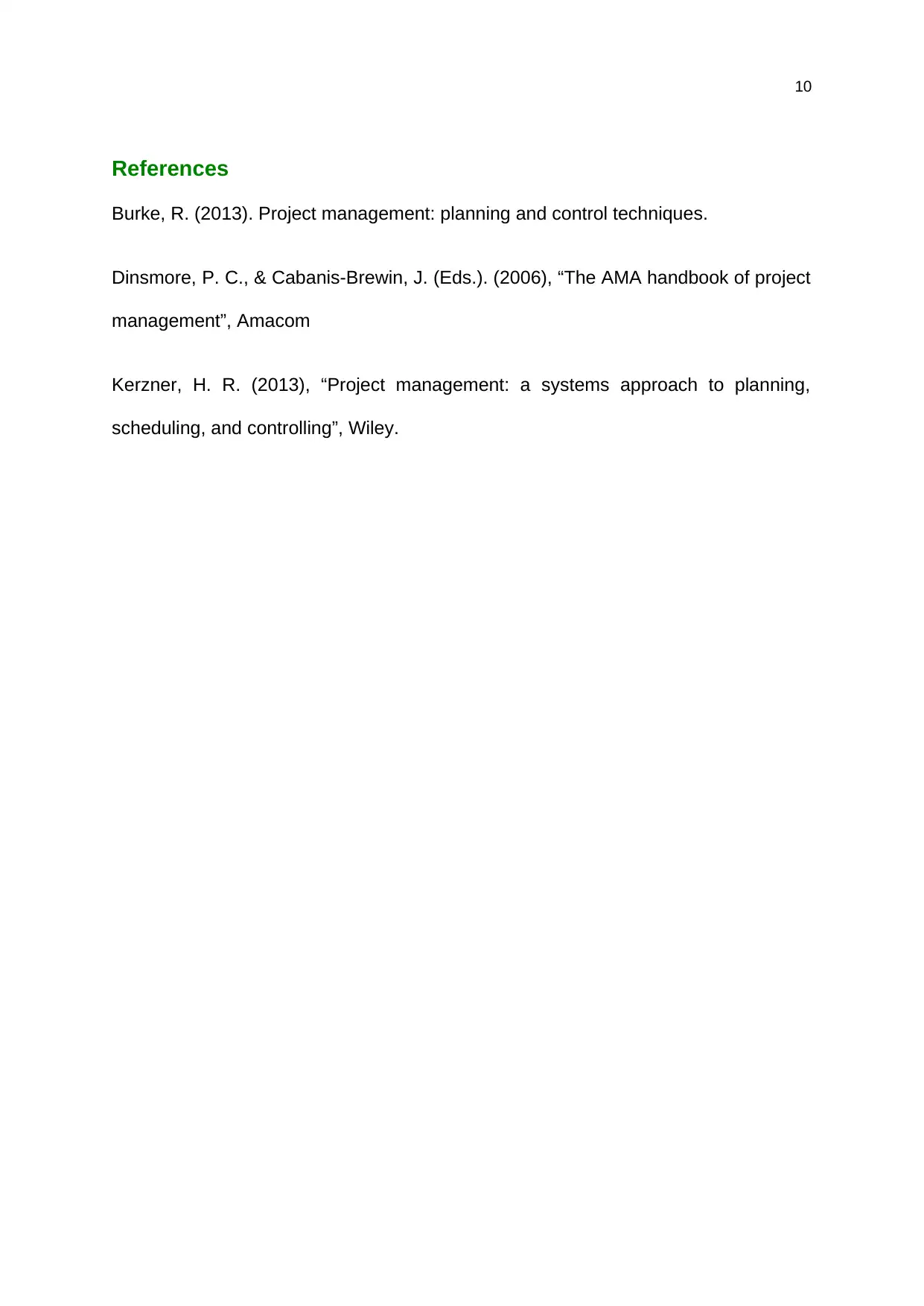
10
References
Burke, R. (2013). Project management: planning and control techniques.
Dinsmore, P. C., & Cabanis-Brewin, J. (Eds.). (2006), “The AMA handbook of project
management”, Amacom
Kerzner, H. R. (2013), “Project management: a systems approach to planning,
scheduling, and controlling”, Wiley.
References
Burke, R. (2013). Project management: planning and control techniques.
Dinsmore, P. C., & Cabanis-Brewin, J. (Eds.). (2006), “The AMA handbook of project
management”, Amacom
Kerzner, H. R. (2013), “Project management: a systems approach to planning,
scheduling, and controlling”, Wiley.
Paraphrase This Document
Need a fresh take? Get an instant paraphrase of this document with our AI Paraphraser
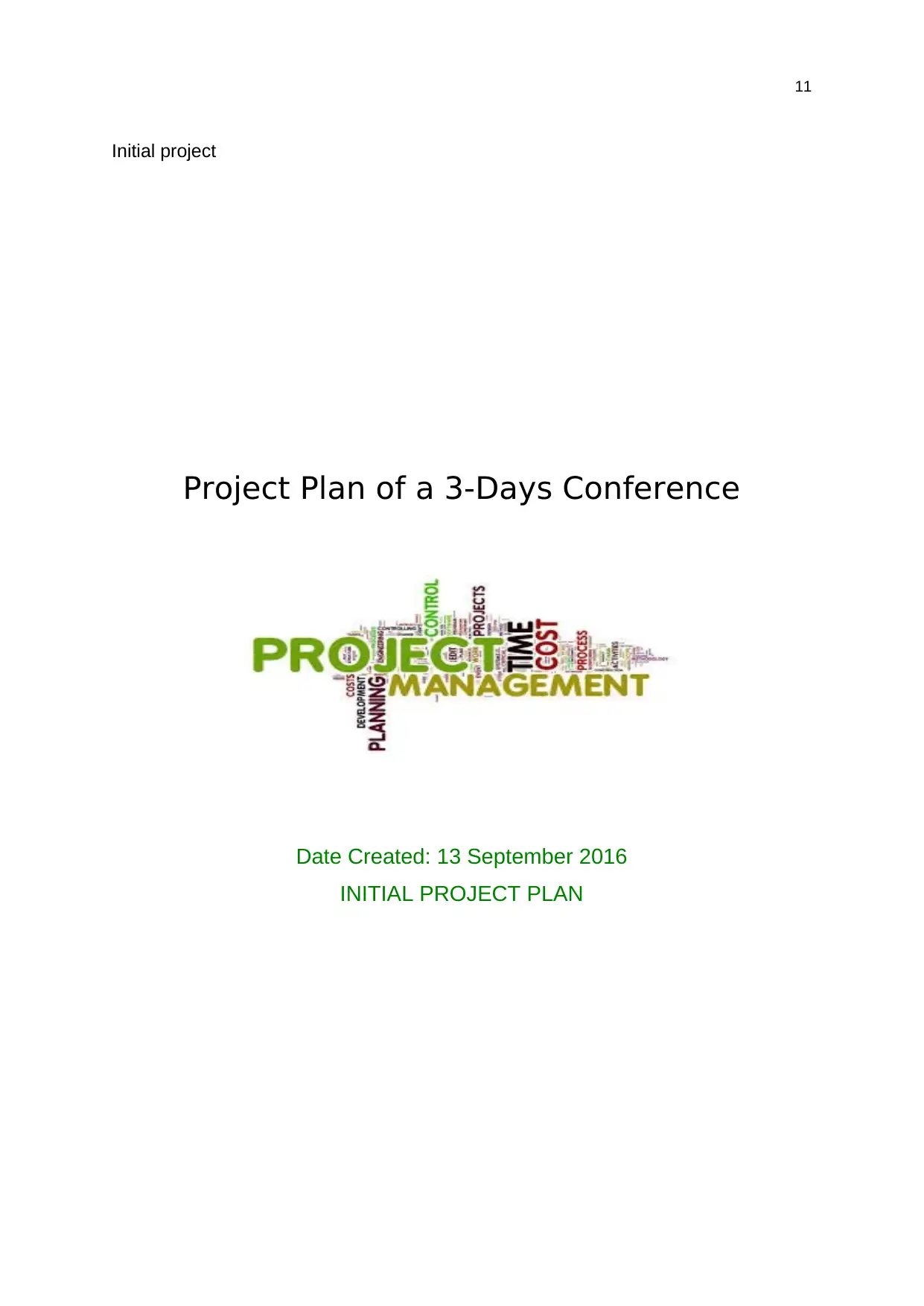
11
Initial project
Project Plan of a 3-Days Conference
Date Created: 13 September 2016
INITIAL PROJECT PLAN
Initial project
Project Plan of a 3-Days Conference
Date Created: 13 September 2016
INITIAL PROJECT PLAN
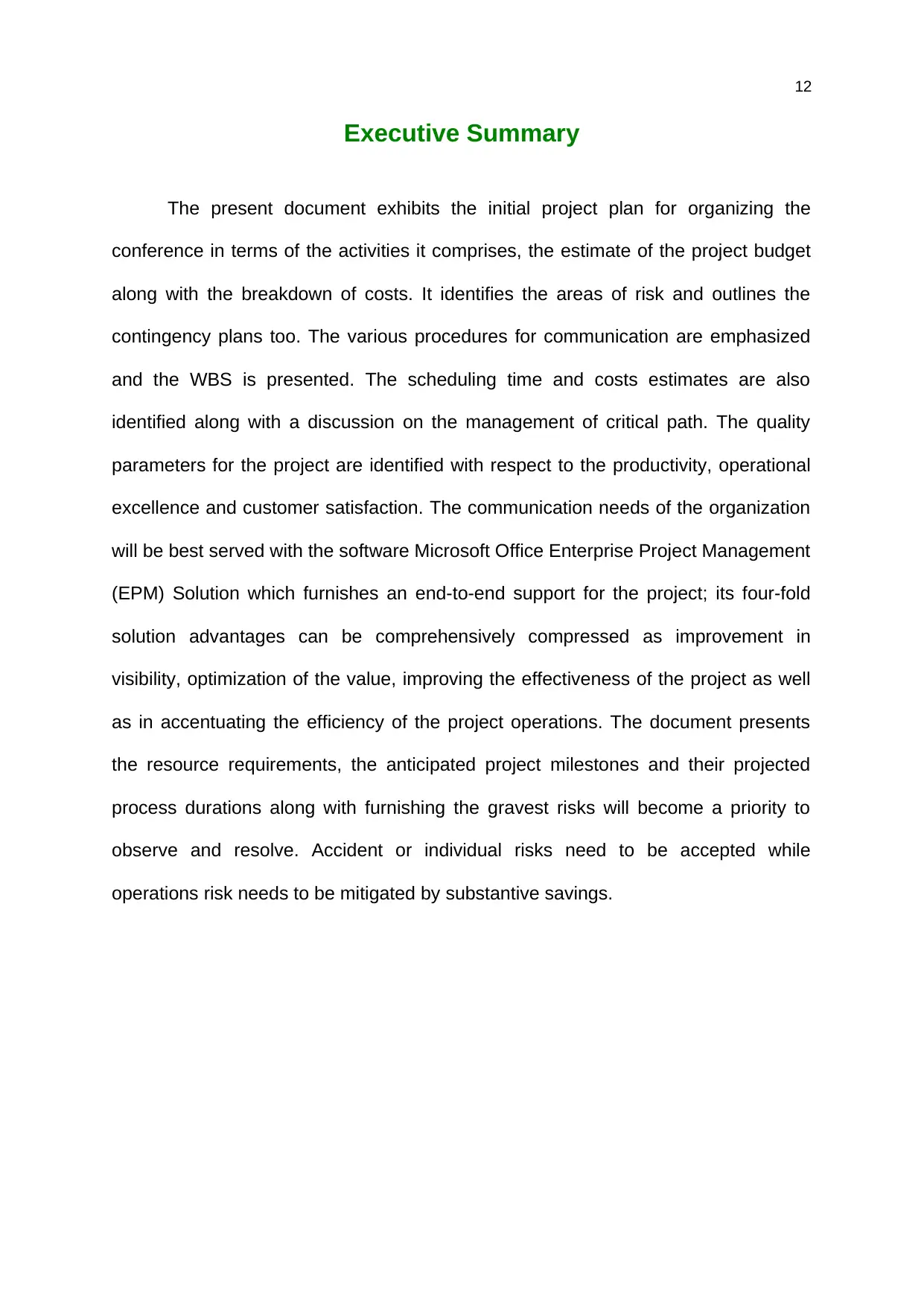
12
Executive Summary
The present document exhibits the initial project plan for organizing the
conference in terms of the activities it comprises, the estimate of the project budget
along with the breakdown of costs. It identifies the areas of risk and outlines the
contingency plans too. The various procedures for communication are emphasized
and the WBS is presented. The scheduling time and costs estimates are also
identified along with a discussion on the management of critical path. The quality
parameters for the project are identified with respect to the productivity, operational
excellence and customer satisfaction. The communication needs of the organization
will be best served with the software Microsoft Office Enterprise Project Management
(EPM) Solution which furnishes an end-to-end support for the project; its four-fold
solution advantages can be comprehensively compressed as improvement in
visibility, optimization of the value, improving the effectiveness of the project as well
as in accentuating the efficiency of the project operations. The document presents
the resource requirements, the anticipated project milestones and their projected
process durations along with furnishing the gravest risks will become a priority to
observe and resolve. Accident or individual risks need to be accepted while
operations risk needs to be mitigated by substantive savings.
Executive Summary
The present document exhibits the initial project plan for organizing the
conference in terms of the activities it comprises, the estimate of the project budget
along with the breakdown of costs. It identifies the areas of risk and outlines the
contingency plans too. The various procedures for communication are emphasized
and the WBS is presented. The scheduling time and costs estimates are also
identified along with a discussion on the management of critical path. The quality
parameters for the project are identified with respect to the productivity, operational
excellence and customer satisfaction. The communication needs of the organization
will be best served with the software Microsoft Office Enterprise Project Management
(EPM) Solution which furnishes an end-to-end support for the project; its four-fold
solution advantages can be comprehensively compressed as improvement in
visibility, optimization of the value, improving the effectiveness of the project as well
as in accentuating the efficiency of the project operations. The document presents
the resource requirements, the anticipated project milestones and their projected
process durations along with furnishing the gravest risks will become a priority to
observe and resolve. Accident or individual risks need to be accepted while
operations risk needs to be mitigated by substantive savings.
⊘ This is a preview!⊘
Do you want full access?
Subscribe today to unlock all pages.

Trusted by 1+ million students worldwide
1 out of 36
Related Documents
Your All-in-One AI-Powered Toolkit for Academic Success.
+13062052269
info@desklib.com
Available 24*7 on WhatsApp / Email
![[object Object]](/_next/static/media/star-bottom.7253800d.svg)
Unlock your academic potential
Copyright © 2020–2026 A2Z Services. All Rights Reserved. Developed and managed by ZUCOL.




